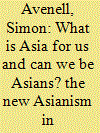| Srl | Item |
| 1 |
ID:
117504


|
|
|
|
|
| Publication |
2012.
|
| Summary/Abstract |
Is the '1960s' a useful concept for understanding postwar Japanese history and, if so, what kinds of changes resulted and how might we chronologize the period? This article proposes the idea of a 'long environmental sixties' in Japan stretching from around 1959 to 1973. The article argues that this period marked important milestones in environmental protest, public opinion, and legislation. By the early 1970s Japan had addressed many of its most pressing industrial pollution problems, in the process placating protest, compensating victims, and establishing an environmental leviathan staffed by hundreds of bureaucrats nationwide. Japan's sixties were a moment of social upheaval, transformation, and new aspirations but, as this article shows, the country's long environmental sixties bequeathed a complex legacy, combining new forms of civic engagement with administrative programs and corporate initiatives to carefully manage the human-environment nexus.
|
|
|
|
|
|
|
|
|
|
|
|
|
|
|
|
| 2 |
ID:
141085


|
|
|
|
|
| Summary/Abstract |
This paper traces the development of the ‘New Asianism’ in Japan over the past quarter of a century. It identifies three broad trajectories or normative positions in the debate: those advocating the replication of a Japanese model in Asia, those in favour of a genuine community of equals, and those who see Asia as the only future for Japan and as a solution for the country's economic and social problems. The paper argues that the evolution and shifting prominence of each trajectory over time is indicative of the ways globalization and regionalization are impinging on imaginations of the nation and facilitating novel perspectives on East Asia in Japan. Although the nation-state is, and will probably remain, an important force behind Japan's relations in Asia for the foreseeable future, the New Asianism may be indicative of its gradual relativization and the beginning of a new, more multidimensional understanding of Asia in Japan.
|
|
|
|
|
|
|
|
|
|
|
|
|
|
|
|